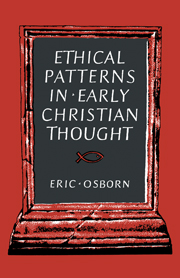6 - FOUR PROBLEMS
Published online by Cambridge University Press: 12 November 2009
Summary
There are four questions which may be considered in the light of what has been learned. Each pattern has at least one problem. The account of righteousness raises the question of natural law, discipleship raises the problem of imitation and the Jesus of history, faith raises the question of how much non-Christian ethics can exist in a Christian ethic and love raises the problem of situation ethics. These issues have all been discussed during the last twenty years. Happily the study of patristic ethics illuminates each of these questions.
NATURAL LAW
Natural law, with its ambiguities, dug itself into Christianity during the patristic period. During its long history the term has come to mean three main things–a universal system of laws, a rational foundation of ethics, and a theory of natural rights. The first two themes play some part in early Christian thought but are far removed from their development in later centuries. The Apologists appealed to a law which was sovereign over all men and to right reason as the guide to conduct; but they did not make the wide claims of Justinian or Aquinas under these headings. Nature was subordinate to the central notion of Logos. The key move is made by Justin, whose scheme is dominated by the Christ who is both Nomos and Logos. Standing in continuity with Matthew's gospel, he speaks of the culmination of all divine law in Christ.
- Type
- Chapter
- Information
- Ethical Patterns in Early Christian Thought , pp. 183 - 213Publisher: Cambridge University PressPrint publication year: 1976



